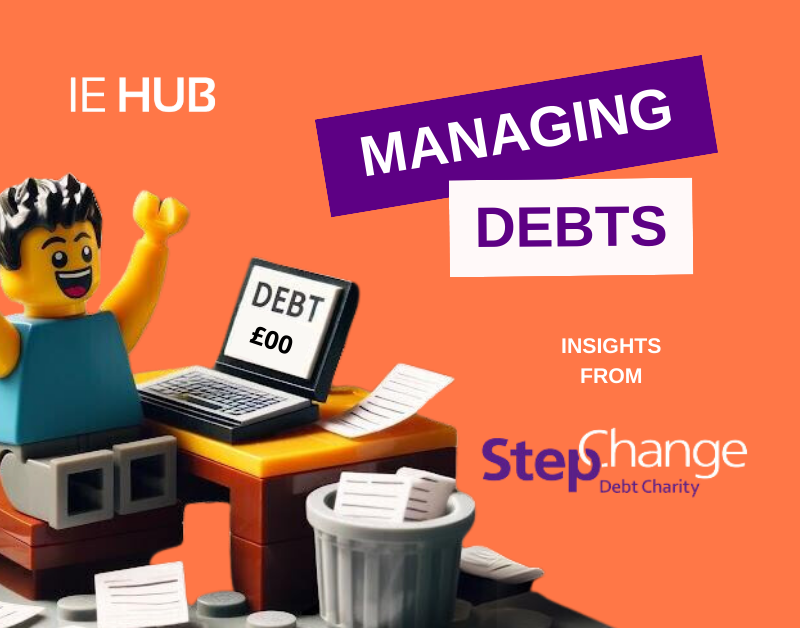
18 Apr
Managing Debt: Insights from StepChange Debt Charity
Debt – it’s a word that can make anyone’s stomach churn. But here’s the thing: managing debt doesn’t have to be so scary. In fact, understanding debt is the first step to taking control of your finances.
That’s why, during Debt Awareness Week, we covered this topic on our Pocket Perspectives podcast at IE Hub.
We were thrilled to have Tom Williams, a Partnership Development Coordinator at StepChange Debt Charity, join us on our podcast to tell us about all things managing debt. But before we get into solutions, let’s break down what debt really means.
Debt Myths
First off – debt isn’t always a bad thing. It’s basically a tool that we use to manage our finances, whether it’s through credit cards or loans. In fact, debt can actually be a good thing for several reasons:
- Emergency Backup Plan: Life can throw anything at you, and having access to credit can be a lifesaver. Whether it’s unexpected car repairs or your boiler needs fixing, having a credit card can help you handle these emergencies. It is however, important not to let your credit card debt get out of hand.
- Boost Your Credit Score: Building a good credit score is so important when it comes to so many things, like mortgages, renting, car finance. By borrowing responsibly and making your payments on time, you can actually use this as a tool to boost your credit score. This helps with so much, such as better interest rates and more opportunities down the line.
- Help with Gaps Between Paychecks: Sometimes, having something like a credit card can actually be really helpful when you know you are going to struggle with having enough money until payday. As long as you know you can pay back the debt and not let it build up.
Whilst all these things suggest that debt might actually have its benefits, when debt becomes out of control, that’s when we have a problem. But before we can start discussing solutions to this, it is important to understand the types of problem debt.
Understanding Debt: What’s Priority and What’s Not
There are two main types of problem debt: priority and non-priority:
- Priority debts are the ones that can become serious if you don’t pay them – think rent, taxes, and utility bills.
- Non-priority debts are important too, but they won’t send you to court if you miss a payment.
We discussed in one of our previous podcast episodes on managing money, that there are multiple ways you can approach paying back these debts, but the most important thing, is to focus on those priority debts. It might seem obvious, but this is where so many people go wrong.
StepChange Debt Charity completed a report of 2023, and found that 33% of their clients are in a negative budget, 42% of those that have an energy bill are in arrears, and 33% of those paying council tax bills are in arrears. These figures emphasise how many people are in problem debt.
The Ripple Effects of Debt
Ignoring problem debts is like ignoring a leaking roof – it might seem okay at first, but the longer you leave it, the worse it gets. We spoke on our podcast about the impact of ignoring your problem debts, and here are some of them:
- Legal Troubles: When problem debts are left to build up, creditors can take legal action against you. This might mean ending up in court with a County Court Judgment (CCJ) against your name, which isn’t great for your financial record.
- Constant Calls and Letters: Ignoring your problem debts means that those letters and calls that you were getting are just going to arrive more and more until you finally start acknowledging them.
- Repossessed Belongings: Some problem debts, like mortgages or car loans, are secured against your belongings, known as assets. If you don’t keep up with payments, then creditors can come knocking to repossess them.
- Credit Score: Ignoring problem debts can cause your credit score to drop rapidly. Late payments, defaults, and CCJs stay on your credit file for years, making it tough to borrow money, rent a property, or even get a job.
- Bankruptcy: When problem debts become overwhelming, bankruptcy might seem like the only way out. But it’s a big deal – it stays on your credit record for years and can seriously affect your financial future.
Remember, ignoring problem debts won’t make them disappear – it’ll just make things worse. If you’re struggling, there’s help out there. Organisations like StepChange Debt Charity offer free, confidential advice to help you get back on track.
You can also use services like IE Hub to let your creditors know that you are struggling. Simply just fill in your budget, share it with all of them, and they will come up with a payment plan to get you on track.
Your creditors do not want you to suffer, and they want to help you get out of debt! Always remember that.
Tips For Managing your Debt
Managing problem debt might seem so complicated and overwhelming, but we’ve got some tips to help you find your way:
Prioritise Your Debts
As mentioned earlier in this blog post, identify which problem debts are most urgent, like those with severe consequences for non-payment, and focus on tackling them first.
The non-priority debts are still important, but they can wait until those more serious ones are paid and out of the way.
Create a Budget
Take a close look at your income and expenses to see where your money is going. Creating a budget helps you place funds for debt repayment and other essentials.

Or if you use a service like IE Hub, then we can actually provide you with a budget to complete, which takes around 20 minutes. Then you can share that with all your creditors who can actually use your budget to see how much problem debt you can afford to pay back each month. With that they will then contact you to set up a payment plan that works for your earnings.
Seek Help
Don’t hesitate to reach out for assistance if you’re struggling with any debt. Remember, there’s no shame in asking for help – it’s the first step toward regaining control of your finances.
Here are three examples of a place you can go for help:
- StepChange Debt Charity – They help thousands of people become debt free every year. Their team of experts offer free, flexible debt advice to anyone who needs it.
- Citizens Advice – They give people the knowledge and confidence they need to find their way forward – whoever they are, and whatever their problem. This includes dealing with debts.
- National Debtline – They are a registered charity providing free, impartial, expert debt advice to more than 100,000 people each year. They have been helping people manage their debts for over 30 years.
Education and Support
Financial education is crucial, so that you can understand what all this problem debt means for you. There are so many resources online that you can use to help you understand it.
As mentioned, we have a full podcast episode dedicated to managing your problem debts, which we hosted with Tom Williams from StepChange Debt Charity. He started out as a debt advisor and so he had some amazing knowledge and tips to share when it comes to the topic!
This episode would be a great place to start if you just want somebody to break it down to you and help you understand what your next steps should be.
Conclusion: You’re Not Alone
Remember this: you’re not alone. Managing debt might seem like a huge stressful thing to deal with, but with a little knowledge and support, you can overcome it.
It all comes down to the fact that you are not expected to understand it and solve it all by yourself. Speak to us at IE Hub to get you started on a budget to share with your creditors, contact StepChange for some personalised debt advice. Take advantage of all the support you can get and take it one step at a time.